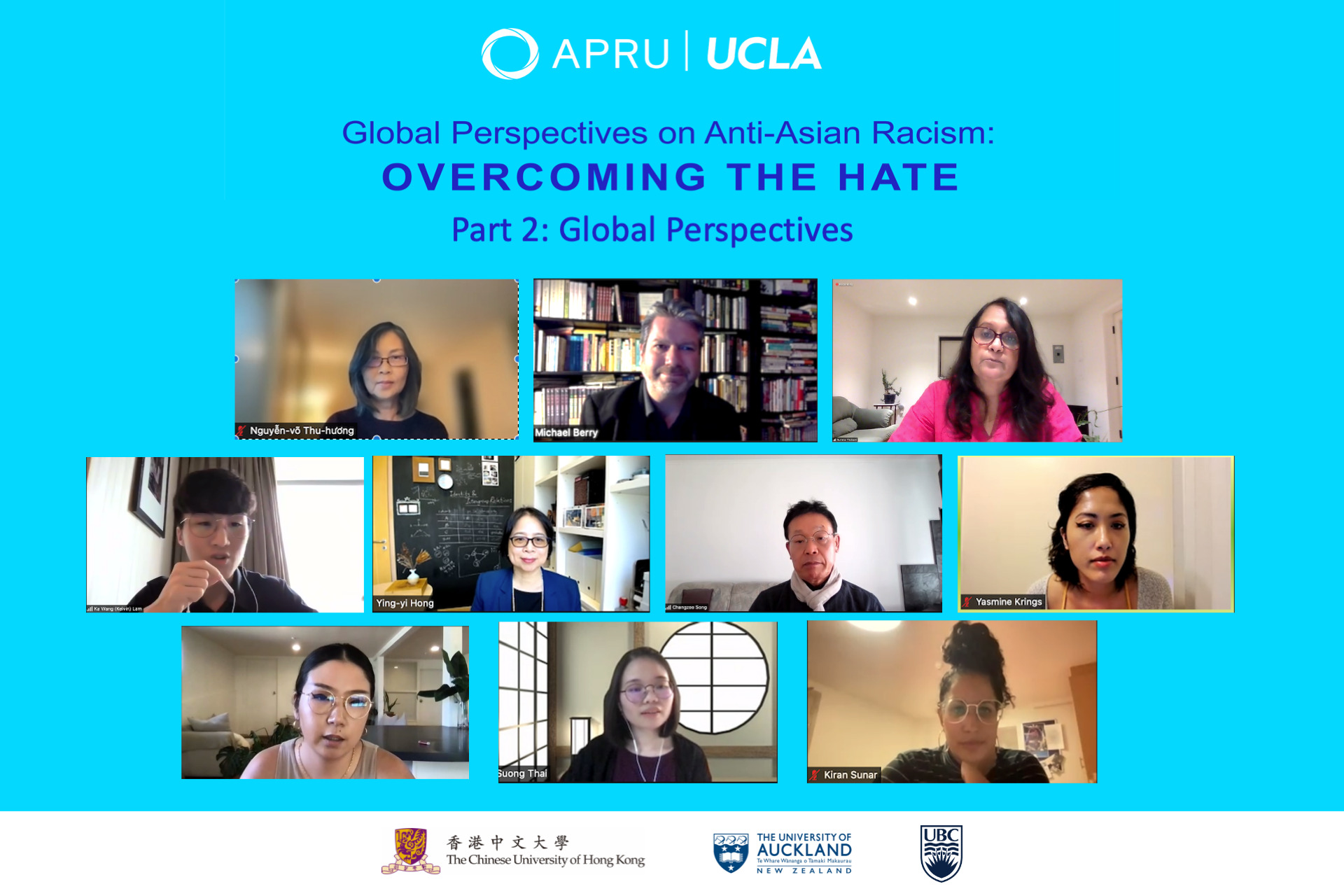APRU successfully held the second part of its “Global Perspectives on Anti-Asian Racism: Overcoming The Hate” webinar series on November 18. Speakers pointed out that the ongoing rises of anti-Asian hate crimes and acts of prejudice against people of Asian heritage is not unique to the Covid-19 era and to the US.
The event featured a faculty panel and a student panel from four APRU universities, namely UCLA, The University of British Columbia, The Chinese University of Hong Kong, and The University of Auckland.
Professor Michael Berry, Contemporary Chinese Cultural Studies and Director of the UCLA Center for Chinese Studies at UCLA chaired the session, emphasizing that this forum provides a space for reflection, analysis, solidarity, and activism to explore Anti-Asian Hate in a global context.
Speakers shared first-hand accounts and analysis exploring Anti-Asian Hate in a global context. They agreed that minority groups across various geographic areas face similar threats and called for coalition and solidarity.
“Our evaluations of attitudes towards Chinese people in different economies in the period between 2002 and 2020 showed an alarming pace of deterioration,” said Ying-yi Hong, Choh-Ming Li Professor of Management, The Chinese University of Hong Kong (CUHK).
“Covid-19 has exacerbated these negative attitudes, but anti-Asian hate can be mitigated through improved international relations, as well as through decategorization and recategorization reducing the ‘perpetual foreigner’ bias against Asian Americans,” she added.
Dr. Changzoo Song, Senior Lecturer, Asian/Korean Studies, University of Auckland, New Zealand, explained the racial history of Aotearoa (New Zealand’s native name), including by pointing out that Chinese miners arriving in Otago from Australia in 1865 were initially much welcome, but that welcome attitudes soon changed to fear when their number grew.
Similarly the US, Canada, and Australia, New Zealand had an unofficial “White New Zealand” policy until the mid-20th century, according to Song.
However, with the rise of multiculturalism, racial violence has been relatively rare in the country in the 21st century until the Christchurch Mosque shooting in March 2019. Asians have been blamed for high housing prices, which led to anti-Asian narratives becoming prevalent in media and politics.
“During the Covid-19 pandemic, Asians, and particularly Chinese, have experienced higher levels of racism,” Song said.
“Surveys show that younger people and rural residents tend to have higher chances of racism and discrimination experiences,” he added.
Sunera Thobani, Associate Professor, Department of Asian Studies and the Institute for Gender, Race, Sexuality and Social Justice, The University of British Columbia, explained that in Canada, Covid-19 was quickly linked to China, including its animal markets and dietary habits, thereby firmly establishing the virus as an Asian threat in Canadian imagery. The only initial public response, Thobani said, was to avoid contact with Chinese Canadians.
“Asians were made scapegoats, drawing away attention from the real causes like decades of globalization and the lack of preparedness of the Canadian public health system,” Thobani said.
Nguyễn-võ Thu-hương, Associate Professor in Asian Languages and Cultures and Asian American Studies, University of California, Los Angeles, linked Anti-Asian racism in the US to the “racialized wars” the US has fought abroad, such as the wars in Vietnam and Afghanistan. The wars created refugees that were typecast into roles dictated by expectations. Refugees faced growing racism and were threatened with detainment and deportation.
“Racialized refugees can hardly become full citizens, and President Biden’s recent rhetoric blaming Afghans’ unwillingness to fight for the unorderly withdrawal of US troops earlier this year supported the notion that refugees can be separated into worthy and unworthy refugees,” Nguyễn-võ Thu-hương said.
Moderated by Yasmine Krings, PhD student of UCLA, the Webinar’s student panel, for its part, set the stage for student leaders to provide their perspectives and recommendations.
Hye Ji (Erica) Lee, Postgraduate Student in Sociology, The University of Auckland, explaining how the concept of “perpetual foreigners” was underpinned by a history of discriminatory legislations in New Zealand.
Lee pointed out that despite 15.1% of the population being ethnic Asian, they are still underrepresented in media, parliament, and the education curriculum.
Similarly, Kiran Sunar, a student from The University of British Columbia, criticized that some professors lament that Indian students could not properly write in English, which is reproach that strengthens racist elitism in the universities, Sunar said.
Suong Thai, PhD student in Cultural and Comparative Studies University of California, Los Angeles, recalled that the Trump administration’s threat to send international students home when there were no onsite classes in the summer of 2020 due to the pandemic made her grasp her precarious status of being a non-citizen.
Ka Wang (Kelvin) LAM, MPhil student, Department of Sociology, The University of Hong Kong, explained how he looked into the challenges refugees in Hong Kong were facing when the pandemic started. According to Lam, they were a “forgotten group” that was not included in local policies. However, a petition initiated by him led to some improvement.
“The petition increased public awareness, and as a result, we got more donations that we used to provide more resources to the refugees,” Lam said.
More information about the webinar series and speakers at here.
Revisit the Part I: Understanding and Overcoming Anti-Asian Hate recording at here.
Revisit the Part II: Global Perspectives at here.

